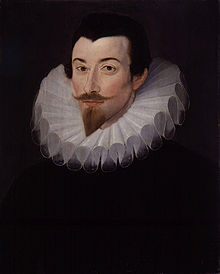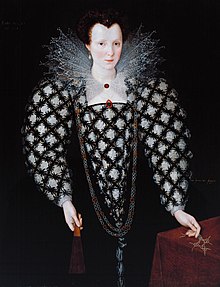Courtier under Elizabeth I
Although he had studied the law, Harington was attracted early in life to the royal court, where his free-spoken attitude and poetry gained Elizabeth's attention. Elizabeth encouraged his writing, but Harington was inclined to overstep the mark in his somewhat Rabelaisian and occasionally risqué pieces.
His attempt at a translation of Ariosto's Orlando Furioso caused his banishment from court for some years. Angered by the raciness of his translations, Elizabeth told Harington that he was to leave and not return until he had translated the entire poem. She chose this punishment rather than actually banishing him, but she considered the task so difficult that it was assumed Harington would not bother to comply. Harington, however, chose to follow through with the request and completed the translation in 1591. It received great praise, and is one of the translations still read by English speakers today.
One of his epigrams is widely quoted:
- Treason doth never prosper? What's the reason?
- for if it prosper, none dare call it treason.
Around that time, Harington also devised England's first flushing toilet – called the Ajax (i.e., a "jakes", then a slang word for toilet). It was installed at his manor in Kelston. This forerunner to the modern flush toilet had a flush valve to let water out of the tank, and a wash-down design to empty the bowl. What it lacked was an S-bend or U-bend to curb noxious smells, which was later invented by Alexander Cumming. Many toilet manufacturers have had the name John as part of the company's title, and there is dispute over whether the current American term "john" has any connection with Harington as its inventor.
In 1596, Harington, under the pseudonym Misacmos, wrote a book called A New Discourse upon a Stale Subject: The Metamorphosis of Ajax about his invention. The book made political allusions to the Earl of Leicester, which angered Elizabeth. It was a coded attack on the stercus or excrement that was poisoning society with torture and state-sponsored "libels" against his relatives Thomas Markham and Ralph Sheldon. After its publication, he was again banished from the court. Elizabeth's mixed feelings for him may have been the only thing that saved Harington from being tried at the Star Chamber.
Campaigns in Ireland
In 1599, Elizabeth sent an army, led by Robert Devereux, 2nd Earl of Essex, to Ireland during the Nine Years War (1594–1603), to subdue a major rebellion by the Gaelic chieftains, led by Hugh O'Neill, Earl of Tyrone. After her strong recommendation that Essex include him in his army, Harington was put in command of horsemen under Henry Wriothesley, 3rd Earl of Southampton. Harington's legacy from this campaign was his letters and journal, which served to give Elizabeth good intelligence about the progress of the campaign and its politics. Harington wrote: "I have informed myself reasonably well of the whole state of the country, by observation and conference: so I count the knowledge I have gotten here worth more than half the three hundred pounds this journey hath cost me." During the campaign, Essex conferred a knighthood on Harington for his services. Essex fell into disfavour with Elizabeth for concluding the campaign by making a truce with Tyrone, which amounted to a virtual capitulation to the Irish rebels – she snapped at Essex: "if I had meant to abandon Ireland, it had been superfluous to send you there" – and for the large number of knighthoods he awarded.
Harington, present at the truce negotiations, accompanied Essex back to court to account to Elizabeth, but met with royal wrath: "Tell my witty godson to get him home ... it is no season to fool it here!" However, his wit and charm soon secured forgiveness: despite his closeness to Essex, he survived his downfall with his own reputation more or less unsullied. During what proved to be the Queen's last Christmas, he tried to lighten her mounting moods of melancholy by reading from his comic verses. Elizabeth thanked him, but said sadly, "When thou dost feel creeping time at thy gate, these fooleries will please thee less – I am past my relish for such matters".

